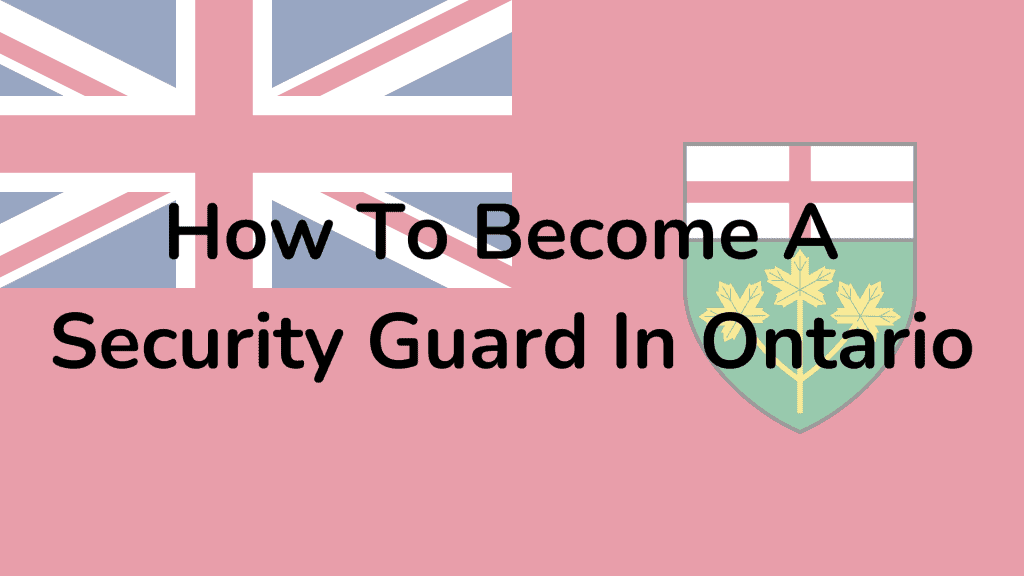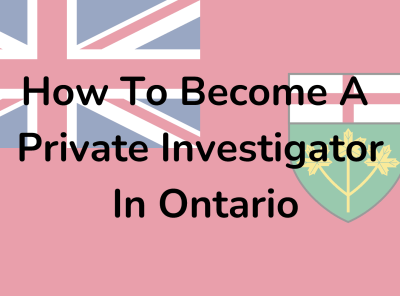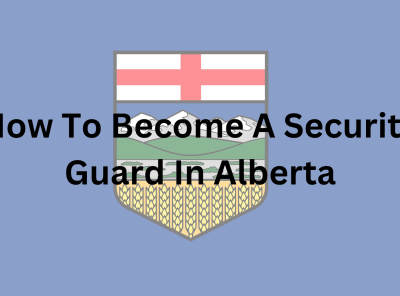How To Become a Security Guard in Ontario – The Ultimate Guide

Becoming a security guard in Ontario involves you in a significant and rapidly evolving sector dedicated to safeguarding individuals, properties, and businesses.
Regulated by the Private Security and Investigative Services Act (PSISA), this industry is characterized by a diverse array of security service providers, including private security firms, in-house security departments, and individual licensed security guards.
Private security firms in Ontario offer a wide range of services such as physical security, event security, mobile patrols, alarm response, access control, and surveillance.
These services cater to various sectors including retail, healthcare, construction, education, entertainment, and corporate environments.
The industry places a strong emphasis on training and licensing to ensure that security personnel are adequately prepared and knowledgeable about their roles and responsibilities.
As a security guard in Ontario, you are an essential guardian of safety and order in our society, actively maintaining a secure environment to protect individuals, properties, and businesses.
Your presence and vigilance serve as a powerful deterrent against criminal activities, reducing the risk of theft, vandalism, and violence.
You will play a critical role in enforcing laws, regulations, and safety protocols, thus promoting lawfulness and order.
Being a security guard in Ontario allows you to contribute to asset protection.
Additionally, your quick response during critical situations can save lives and minimize harm.
Understanding the Role of a Security Guard in Ontario
Being a Security Guard in Ontario plays a critical role in maintaining safety and security within designated areas.
Responsibilities encompass safeguarding premises and preventing theft, vandalism, and violence through vigilant monitoring and patrols.
Routine security checks are conducted to ensure the implementation of safety measures for the protection of the establishment and its patrons.
In the retail sector, security personnel are crucial for mitigating theft, shoplifting, and fraudulent activities.
They deter potential criminals, monitor surveillance systems, and conduct regular patrols, creating a secure environment for both shoppers and employees.
Within the corporate sector, security personnel are responsible for protecting assets, employees, and sensitive information.
As a security guard in Ontario, you will ensure that access to the premises is regulated, conduct security screenings, and respond to emergencies.
By safeguarding valuable assets and maintaining a secure work environment, they contribute to business continuity and foster a sense of safety among employees, ultimately enhancing productivity.
During events, security personnel are essential for crowd management, access control, and emergency response.
They assist in guiding attendees, ensuring compliance with event rules, and promptly addressing any security concerns.
Their presence offers reassurance to event-goers, promoters, and organizers, creating an environment where individuals can participate and enjoy the event without compromising safety.
Basic Requirements for Aspiring Security Guards
If you are aspiring to become a security guard in Ontario must be at least 18 years old to pursue a career in the security industry and should possess legal eligibility to work in the country, including being a Canadian citizen, a permanent resident, or holding a valid work permit or visa.
They are expected to maintain good physical health and fitness, capable of enduring extended periods of standing, patrolling, and responding swiftly during emergencies.
Moreover, candidates should demonstrate strong mental resilience, problem-solving skills, emotional stability, and the ability to make sound judgments and decisions, particularly in challenging or high-stress situations.
Adaptability and maintaining composure under pressure are fundamental qualities for success in the security industry.
One of the fundamental prerequisites for aspiring security guards in Ontario is to have a clean criminal record.
This requirement ensures that individuals with significant criminal convictions are disqualified from working in the security sector.
A clean criminal record indicates a history free of serious offences, promoting trust and confidence in the security guard's ability to maintain safety and security in their role.
Educational and Training Requirements
Security guards in Ontario are required to complete the 40-hour mandatory training course known as the “Basic Security Guard Course.”
This course is standardized and regulated by the Private Security and Investigative Services Act (PSISA) and covers essential topics such as legal responsibilities, emergency response procedures, conflict resolution, and effective communication skills.
Completing this course is a prerequisite for obtaining a security guard license in the province.
First Aid and CPR certification is a crucial component of a security guard's training.
Being trained in First Aid and CPR equips security guards to respond promptly and effectively in medical emergencies.
Whether it's administering first aid to an injured individual or performing CPR, this certification significantly enhances a security guard's ability to mitigate harm and save lives.
It underscores the importance of immediate response and aid during critical situations, aligning with the overarching goal of ensuring public safety and well-being.
To advance in their careers and excel in the security industry, security guards in Ontario are encouraged to pursue additional specialized courses.
Some recommended options include:
Use of Force Training: Enhances skills in dealing with potentially violent situations, ensuring appropriate use of force when necessary while minimizing harm to all parties involved.
Crisis Intervention and De-escalation: Equips security guards with advanced techniques to effectively manage high-stress situations, defuse conflicts, and maintain a safe environment.
The Licensing Process
Steps to Obtain a Security Guard License in Ontario
Once an individual fulfills the necessary qualifications, becoming a Security Guard in Ontario involves completing three essential steps:
Basic Training Course
The 40-hour Basic Training Course for Security Guards in Ontario, mandated by the Private Security and Investigative Services Act (PSISA), is a fundamental program designed to equip individuals with the necessary knowledge and skills for working as security professionals in the province.
This course plays a pivotal role in the licensing process, ensuring candidates meet the required standards to effectively maintain public safety and security.
Upon successful completion, a certificate is awarded, containing a completion number essential for registering with ServiceOntario to schedule the licensing exam.
Licensing Exam
The licensing exam assesses the understanding of the material learned during the basic training course.
Consisting of 60 multiple-choice questions, the exam results are usually available within two days. Administered by MSG's testing provider, Serco, the exam takes place at various DriveTest centres across Ontario. The exam is also available online.
Visit ontariosecuritytesting.com for details regarding the exam and testing locations.
Read our detailed guide on the Ontario security guard exam.
Application for a Security Guard License
Upon successful completion of the basic training course and passing the exam, one can proceed to apply for a Security Guard license.
The application is submitted through ServiceOntario via mail or online. Personal information collection, including name, address, and testing completion number, is necessary for processing the application and accurately updating the Security Guard's license details.
Along with a completed application form, essential documents to include:
- a completed Guarantor Information Form
- a passport-quality photo
- photocopies of two (2) valid identification documents (front and back)
- the application fee
- current Criminal Record and Judicial Matters Check (CRJMC)
The approval process for the application may take up to 10 days. Opting for a digital license is often a faster option, available upon approval.
However, receiving the hardcopy version by mail may take up to 8 weeks. Carrying the license while on duty and presenting it upon request is mandatory.
Costs Associated with Licensing
Becoming a licensed Security Guard in Ontario involves several associated fees, including:
Basic Training Course Fee: The cost for the basic training course typically ranges from $250 to $500. The specific fee varies depending on the instructor and the institution or company providing the course.
Exam Fee: Test Fee is $35.00 plus 13% HST for a total of $39.55.
License Fee: The license issuance involves a fee of $80.00, an essential cost for obtaining the security guard license.
These fees cover the essential aspects of training, examination, and license acquisition necessary for pursuing a career as a security guard in Ontario.
Renewal and Maintenance of the License
Renewal of your security guard license is required every two years, with the expiration set for two birthdays following the date of issuance.
To maintain legal authorization to work as a security guard, the renewal process should be initiated at least 30 days before the license expiration date.
To renew a license or restore an expired license, you must submit an application through ServiceOntario. It is the same application that is used to apply for a new license.
Finding Employment as a Security Guard
Embarking on a career as a security guard involves not only meeting the necessary qualifications but also effectively presenting oneself to potential employers and conducting interviews.
Here's a guide to help aspiring security guards find the right employment opportunities.
Tips for Crafting an Effective Resume
When crafting a resume for security jobs, highlight relevant skills and experiences that showcase your suitability for the role.
Emphasize your ability to handle emergencies, excellent communication skills, knowledge of security protocols, and any related training or certifications.
Tailor each resume to the specific job you're applying for, showcasing how your skills align with the job requirements.
Done For You Resumes
We have partnered with We Love Resumes to provide a resume-writing service for our users who are in need of a new or updated security guard resume.
Use discount code SECURITYGUARD2023 to save 5% off your order.
Navigating Job Boards and Security Agencies in Ontario
Utilize job boards and security agencies to explore available opportunities.
Websites like Indeed, Workopolis, or specialized security job portals can be excellent resources. Some of the larger companies have their own job boards. Walmart is a good example.
Additionally, consider reaching out to security agencies directly. Submit your resume and cover letter to reputable agencies, expressing your interest in security positions.
Networking and attending industry events can also provide insights into available job openings.
Preparing for Interviews and Understanding What Employers Look For
Preparing for a security guard job interview involves understanding what employers seek in potential hires.
Showcase your problem-solving abilities, adaptability, and awareness of legal and ethical responsibilities.
Highlight instances where you demonstrated strong judgment and effective communication in challenging situations.
Dress professionally, arrive early, and be ready to discuss your experiences and how they align with the job's demands.
Remember, being a security guard requires a blend of technical knowledge, interpersonal skills, and the ability to act under pressure.
Showcase these qualities throughout your job search process to stand out in a competitive job market and secure a fulfilling role in the security industry.
Continuing Education and Career Advancement
Importance of Staying Updated with the Latest Security Protocols
In an era of rapid technological advancements and sophisticated threats, security protocols are in a perpetual state of evolution.
Staying informed about the latest security measures and protocols is crucial for security professionals.
It ensures they can effectively respond to emerging threats, adopt cutting-edge technologies, and implement best practices to safeguard individuals, assets, and information.
Moreover, being knowledgeable about the current security landscape enhances the credibility and reliability of security professionals.
Opportunities for Specialization
Continuing education opens doors to various specializations within the security domain.
One of the rapidly growing fields is cybersecurity, given the surge in digital threats. Security professionals can focus on acquiring specialized skills in cybersecurity, including threat detection, ethical hacking, and data protection.
Additionally, specialization in executive protection equips professionals to provide personalized security services to high-profile individuals and organizations, an increasingly critical need in today's society.
Pathways to Higher Roles
Continual learning and skill development can pave the way to higher roles in security management or consulting.
Gaining expertise and experience through advanced training and certifications can qualify professionals for managerial positions, where they oversee security operations, develop strategies, and manage teams.
Furthermore, with comprehensive knowledge and a successful track record, transitioning into a consulting role becomes a viable option.
Security consultants provide valuable insights and recommendations to organizations, assisting them in enhancing their overall security posture.
Investing in continuing education and professional development not only keeps security professionals competitive in the job market but also contributes to the collective security and safety of society.
The security landscape will continue to evolve, and those who commit to lifelong learning will find themselves well-positioned for a fulfilling and impactful career in the security industry.
Legal and Ethical Responsibilities
Overview of the Private Security and Investigative Services Act
PSISA stands for the “Private Security and Investigative Services Act.”
It is a piece of legislation that governs the private security and investigative services industry.
The PSISA sets out regulations and requirements for individuals and companies involved in activities such as security guarding, private investigations, and electronic security services within Ontario.
Under the PSISA, individuals and businesses in these sectors must adhere to specific licensing and training requirements to operate legally in Ontario.
The Act aims to ensure the professionalism, integrity, and competence of those providing security and investigative services in the province while safeguarding the rights and privacy of individuals.
Code of Conduct and Ethical Considerations for Security Guards
Upholding a strong code of conduct and adhering to ethical considerations are fundamental to maintaining trust and professionalism in the security industry.
The Canadian government emphasizes the importance of professionalism, integrity, respect for all individuals, adherence to the law, effective communication, and continuous professional development.
Security guards must also prioritize confidentiality, personal accountability, and preparedness for emergencies.
By embodying these values and principles, security guards contribute to a safer and more secure society, upholding the public's trust and safety.
Handling Challenging Situations and Conflicts
Handling challenging situations and conflicts is a crucial aspect of a security guard's role. Security personnel should possess effective communication and conflict resolution skills to de-escalate tense situations peacefully and swiftly.
Maintaining a calm and composed demeanour, active listening, and understanding the concerns of all parties involved are essential strategies.
In challenging situations, security guards must follow established protocols, prioritize safety, and act within the bounds of the law.
They should assess the situation, assess potential risks, and respond with appropriate measures to ensure the safety and well-being of individuals and property.
Training and continuous improvement in handling diverse and challenging scenarios are vital for security guards to effectively manage conflicts and maintain a secure environment.
Conclusion
In conclusion, the process of becoming a security guard in Ontario involves fulfilling specific eligibility criteria, undergoing comprehensive training, passing a licensing exam, and maintaining up-to-date licensure through regular renewals.
By adhering to these steps and demonstrating a dedication to upholding safety and security, aspiring individuals can embark on a fulfilling career in the security industry, playing a vital role in safeguarding communities and assets within the province of Ontario.
Embarking on a career as a security guard offers the opportunity to be a vital part of ensuring safety and order in your community.
Your dedication to this profession can make a significant difference by protecting individuals, properties, and businesses.
Embrace the training and opportunities for advancement, staying committed to continuous learning and growth within the security industry.
Share and Engage
Spread the knowledge by sharing this ultimate guide with anyone interested in pursuing a career as a security guard in Ontario.
Help them embark on their path to making a positive impact on safety and security.
Share your experiences or questions about becoming a security guard in Ontario in the comments below.
Your insights can inspire and guide others on their journey toward a fulfilling and meaningful career in the security industry.
Last Updated on Oct 15, 2024









